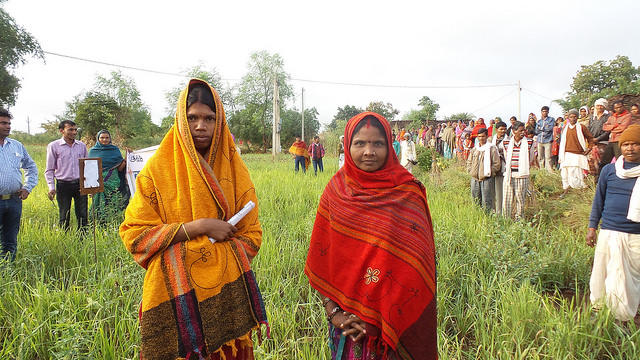Agricultural biodiversity to manage risks and empower the poor

Proceedings are now available from an International Conference held in Rome in 2015 to launch the IFAD and EU supported Initiative ‘Linking agrobiodiversity value chains, climate adaptation and nutrition: Empowering the poor to manage risk’.
Proceedings are now available from an International Conference held in Rome in April 2015 to launch the IFAD and EU supported Initiative ‘Linking agrobiodiversity value chains, climate adaptation and nutrition: Empowering the poor to manage risk’.
The conference brought together people with expertise in different areas to discuss the role of agricultural biodiversity in fostering more resilient livelihoods, and to solicit their guidance to refine the methodological framework to be followed over three years.
The consultative process was strategic for promoting the interdisciplinary dialogue that is fundamental to the initiative, which follows a ‘holistic value chain approach’. This approach has been developed by Bioversity International during the last 15 years and has been successfully deployed for use-enhancement of minor millets in South Asia and Andean grains in Bolivia and Peru.
The initiative is applying this approach in three new contexts, working with fonio and Bambara groundnut in Mali, Mayan spinach and tepary bean in Guatemala and kodo and little millet in Madhya Pradesh.
The proceedings include abstracts of presentations and the results from working groups that provided key inputs to refine the monitoring and intervention plan for the Initiative around four themes:
- food and nutrition security under climate change
- value chain upgrading
- conservation of plant genetic resources
- empowerment of vulnerable groups.
The proceedings also share site specific plans for implementing the research in Guatemala, India and Mali by the partner agencies Universidad del Valle de Guatemala (UVG), Action for Social Advancement (ASA), the Institut d’Economie Rurale (IER), and the Indigenous Partnership for Agrobiodiversity and Food Sovereignty. These plans were refined through discussions at the International Conference and subsequent stakeholder consultations held in Mali, India and Guatemala. During these consultations, a thorough analysis of the local situation for nutrition, climate change, vulnerable groups and agricultural biodiversity was made to gain appreciation of how underutilized crops can be mobilized to enhance nutrition, livelihood resilience and income generation.
The questions for the baseline focus group discussions and household surveys that were defined incorporating the feedback from this interdisciplinary Conference are also included to further promote discussion and application of holistic agricultural biodiversity based approaches.
This publication will be of interest to researchers and practitioners looking to promote the use of agricultural biodiversity to leverage its values for nutrition, climate change adaptation, income generation and empowerment of vulnerable groups, while supporting on-farm conservation of precious plant genetic resources. It provides practical and theoretical insights on implementing and monitoring the results of holistic approaches for agricultural development.
- Download the proceedings
This work is carried out through Bioversity International's Healthy Diets from Sustainable Food Systems Initiative. It is supported by the UN International Fund for Agricultural Development (IFAD) , the European Commission and the CGIAR Research Program on Climate Change, Agriculture and Food Security (CCAFS).
Photo: Farmer field day in a participatory evaluation plot for kodo millet in Dindori, Madhya Pradesh. Credit: Bioversity International/G. Meldrum
